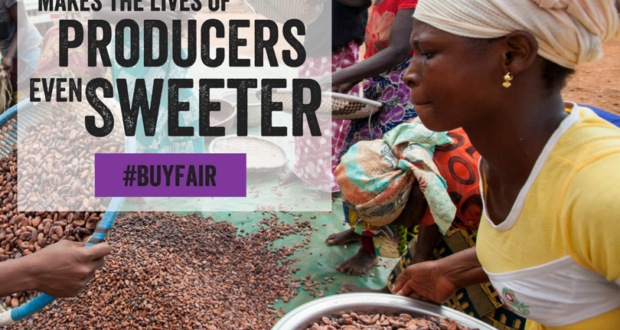Fairtrade Fortnight (3–16 August) highlights the international movement supporting better working conditions and improved terms of trade for farmers and workers in developing countries. Rev John Martin explores the link between Fairtrade and the Gospel, focusing on ways that congregations can be involved.
I was recently preparing to go to a church to talk about Fairtrade and the Gospel.
A few days before, I asked for Fairtrade tea and coffee to be served after church. An excited email came the next day. My contact in the congregation had located Fairtrade tea and coffee in the local supermarket and had bought them ready for Sunday.
One Uniting Church congregation now making a difference.
A year or so ago I was visiting a Uniting Church in inner suburban Melbourne. After the service, I asked the woman serving if this was Fairtrade coffee. “Of course,” she replied, affronted, “this is Brunswick!”
An increasing number of people are aware of Fairtrade, where workers, farmers and artisans in developing countries receive fair wages and work in healthy conditions in an environmentally sustainable way.
Fairtrade is an expression of the justice dimension of the Gospel. It is an aspect of how we can love the neighbour we cannot see. It is a way of demonstrating that each person—no matter where they are on the planet—is created in the image of God and therefore ought to receive equal and fair treatment as the products of God’s good creation are shared. It is a way of illustrating God’s love for the world, the cosmos, which motivated God’s sending of Jesus (John 3:16).
The Fairtrade Mark can be found on an increasing range of supermarket products, especially tea, coffee and chocolate. This mark guarantees fair wages and good working conditions, along with a financial premium which enables communities to build schools, health facilities and waters supplies.
Mostly when we hear about the plight of the poor and the disenfranchised, we feel totally helpless. We can write to local members, go to rallies, sign petitions and donate money. Fair trade is a way of lifting people directly from poverty to sustainability by doing what we already do every week: shop for commodities.
Fairtrade Fortnight is a way of drawing attention to the ways we can help. It can be the launching pad for you to make a change and for your church to make a difference every Sunday morning or whenever you meet for worship and whenever else you meet by switching to Fairtrade tea and coffee.
 JourneyOnline
JourneyOnline







